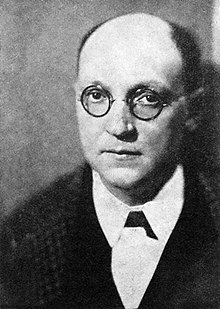Georges Duhamel
| Georges Duhamel | |
|---|---|

Georges Duhamel ca 1930
|
|
| Born | 30 June 1884 Paris |
| Died | 13 April 1966 Valmondois |
| Spouse(s) | Blanche Albane |
Georges Duhamel (June 30, 1884 – April 13, 1966) was a French author, born in Paris. Duhamel trained as a doctor, and during World War I was attached to the French Army. In 1920, he published Confession de minuit, the first of a series featuring the anti-hero Salavin. In 1935, he was elected as a member of the Académie française. He was nominated for the Nobel Prize in Literature twenty-seven times.
Georges Duhamel, born Denis Thévenin, was born in the 13th arrondissement of Paris on 30 June 1884. He was the third child of a family which struggled to survive on the income of his unstable father. The strains and tensions of these early years are reflected in his famous autobiographical novel Le Notaire du Havre (1933), the first book of his Pasquier saga.
In spite of this childhood disrupted by numerous crises, which on far too many occasions caused the Duhamel family to relocate abruptly, Georges nonetheless passed his baccalaureate in 1902. His first choice of career was to become a doctor, although he had a great love of literature and the arts and continued to pursue these interests also.
Between 1906 and 1909 he founded an artistic community l'Abbaye de Créteil with Charles Vildrac (who would become his brother in law). The group brought together poets, writers, musicians and painters. From 1912, he became an editor of the literary review Mercure de France. In 1935, he took over the direction of the review and its publishing house. In 1937, he was elected to the French Académie Nationale de Médecine. In 1938, because of Duhamel's anti-war stance, he was replaced by Jacques Bernard, but Duhamel returned to directing the Mercure de France publishers in 1945 (he was majority stock-holder of the company).
When the First World War was declared, Duhamel signed up and worked as an army surgeon for four years, often in dangerous situations. This painful experience provided the subject matter for two narratives which brought him immediate success, Vie des martyrs and Civilization (which won him the Prix Goncourt in 1918). Once he returned to civilian life, Duhamel dedicated himself to literature and defending human civilisation. In 1919, he found two spots in the Val-d'Oise where he would henceforth spend his summers (Sausseron Valley and Valmondois).
...
Wikipedia
